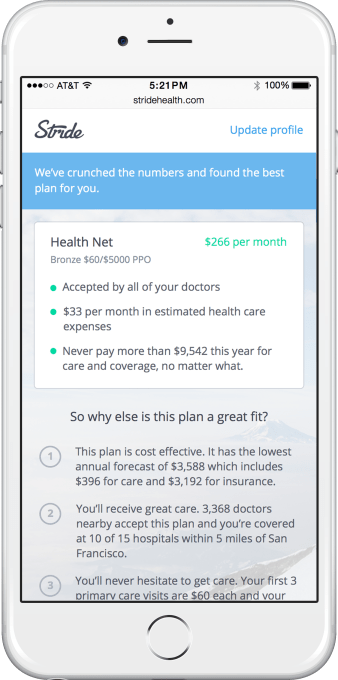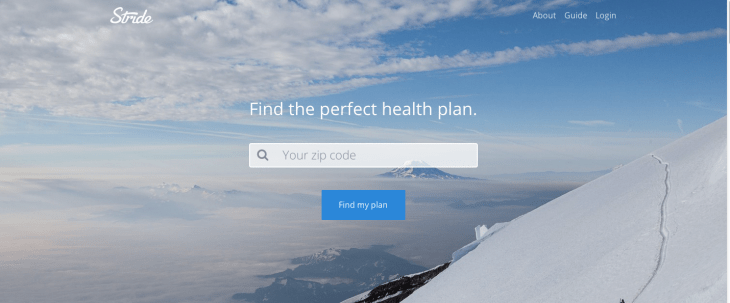Stride Health has launched a new mobile-focused version of its healthcare recommendation engine targeting the beleaguered workers who comprise the nation’s 1099 laborers.
Essentially Stride acts as a private competitor to the federally funded healthcare.gov. The company says its service provides a high-tech recommendation engine for healthcare coverage that’s tailored to suit the individual needs of someone who’s looking for a new insurance plan.
The company’s bread-and-butter is the newly mobile workforce. According to company data roughly 60% of its users start their searches for health insurance on a mobile device. Nearly half of those (about 45%) end up actually enrolling in a health plan through a mobile device.
Setting aside the argument over the new contract economy (either representing Silicon Valley’s latest generation of serfers or the future of freelancing and a boon to individuals who want to be their own boss), the Affordable Care Act requires that individuals seek out coverage or face penalties — and Stride Health makes the process easier.
It’s also more necessary as a growing number of Americans turn to the contract economy. According to data from Stride, over 50 million workers in the U.S. are freelancers, or about 34% of the population.
 Less than a year after its launch, the company has expanded its operations beyond California to Florida, Illinois, Pennsylvania, New York, and Texas and officially disclosed $2.4 million in a seed financing round led by Fidelity Biosciences and NEA. Previous investors including Kleiner Perkins Caufield & Byers, DCM, the Mayo Clinic and the healthcare seed fund Rock Health also participated.
Less than a year after its launch, the company has expanded its operations beyond California to Florida, Illinois, Pennsylvania, New York, and Texas and officially disclosed $2.4 million in a seed financing round led by Fidelity Biosciences and NEA. Previous investors including Kleiner Perkins Caufield & Byers, DCM, the Mayo Clinic and the healthcare seed fund Rock Health also participated.
The company also signed on as the official partner for on-demand-service companies Uber and TaskRabbit, coming pre-loaded in the devices those companies provide to their contract laborers. The company will deliver its advice on coverage to contractors in the open enrollment cycle beginning on November 15th.
“You can rapid fire build a health profile about yourself,” says Stride Health co-founder Noah Lang. The government’s website is difficult to understand and hard to navigate for most Americans online, let alone on a mobile device.
Stride’s recommendation service requires users to fill out a short questionnaire with information about medical history, location, family, pre-existing conditions, prescriptions and current physicians. As Lang wrote in an email, “Stride Health starts by generating a financial forecast for your entire year’s potential health investment — and then narrows to your personalized plan recommendation based on your preferences for doctors, drugs, and quality of care.”
It’s a far simpler process than relying on the government’s sites, says Lang. “There are a lot of barriers to buying coverage from state or federal exchanges,” he says. “They’re not mobile friendly and they speak the language of insurance companies.”
In a country where roughly 11% of the population is uninsured and 52% of the insured population is switching, keeping switching costs low and keeping users informed is key, Lang says.
Stride makes money by taking a commission on the health care policy that its users eventually buy. “We only make money if you buy and it doesn’t cost the consumer a dime,” he says.
Both physical fitness nuts, Lang and his co-founder Matt Butner, a data scientist and engineer who worked on personalization projects for companies like Netflix and Priceline, met while climbing Mt. Whitney.
Indeed, the company touts its service as being ideal for not just contract laborers, but also for non-traditional self-employed workers like extreme sports athletes and populations whose needs aren’t currently met by government sites (like the Spanish-speaking population of the US).

